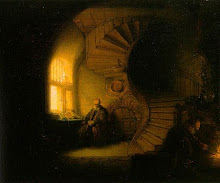Cicero compares the earth to a vast theatre: Quemadmodum theatrum cum commune sit, recte tamen dici potest ejus esse eum locum quem quisque occuparit. “As the theater is common, yet it may rightly be said that it is the place which everyone occupies.” For years now – decades, really – I’ve been playing a man devoted to the arts, mainly poetry, who followed a different drummer, the beat of the beats, a fool, essentially, who pursued chimeras of alchemical glory.
Now I’m old and I don’t know where I am. The curtain
is coming down. But I don’t hear applause. I hear Bang A Gong (Get It On) on
YouTube. 96 Tears by ? and The Mysterians. Water running in the kitchen sink.
Barely audible little electrical beats coming out of a desktop clock. Must be
cogs, whatever mechanical delicacies mesh in unison. Big thumps and grind of
scraping objects, cookware of some sort, emanating from the kitchen upstairs. The
U.S. of A is a noisy place. A theater of jackhammers, cars, sirens, fireworks,
garbage disposals, vacuums, backhoes, forklifts, nail guns, chainsaws, framing
saws. And music. The noise is permanent. The music is occasional. All Along the
Watchtower. Jimi Hendrix. Needles and Pins. Jackie de Shannon. What is the
difference between music and noise music is a sound which produces a pleasing
sensation while noise is an unwanted and unpleasant sound. But is music always
pleasing? It’s the dissonances the make music interesting, give it its texture
and edgy grin.
I didn’t audition for the part. I grew into it. I
didn’t know my lines at first. I just stumbled over the few words that dropped
from my brain into my mouth. When I discovered alcohol, I found this much
easier to do. I blubbered. I howled. I spewed poetry for attention. This is the
thing that puts us on stage. That craving for attention. And to play a role
that gets us out of our skin and into the skin of someone else. Someone like
you. Or that guy over there, sitting in a chair at the library, reading Confederacy
of Dunces. Imagine picking someone at random and slipping into their body
for a day. Saying things they’d never say. Doing things they’d never do. So
that when they were themselves again everyone in their life would be asking a
lot of questions.
I played a man who devoted himself to literature,
novels and poetry and even some journalism. Then, toward the end of his life,
he watches the death of literature. People no longer reading. Curiosity dead.
Intellect dead. Imagination dead imagine. So that it’s sad, even, to hold a
book in the hand, that solid thing dense with perspective and berth between
piers, the bobbing and rolling of ideas on an ocean of words, on paper, in a
book, with a title and a spine. What will become of Shakespeare? Gertrude Stein?
Viriginia Woolf? Calixthe Beyala? Marcel
Proust? Bei Dao? Yasunari Kawabata? Henrik Ibsen? James Joyce? Samuel Beckett? Edgar Allan Poe?
If this was a play in
progress now would be a good place for a soliloquy. Fuck these zombie turds.
I’m going to keep writing. Even if the thinking gets muzzy and convoluted does
it matter? Once the idea of an audience is squelched the writing is liberated,
but purposeless. The two go together. It’s an anomie that results in a lot of
mongrel anomalies. Godzilla in a Noh play. Liberation is sexy and makes you
giddy but there’s always that sinking feeling that what you’re doing is done
for nothing, for the sake of what, the sake of nothing. I’ll say it again: the
sake of nothing. When did a body of writing ever stop people from killing one
another? Hint: it wasn’t the Bible. It wasn’t the Vedas. It wasn’t the
Mahabharata. It wasn’t the Divine Comedy and it wasn’t Moby Dick. It wasn’t The
Canterbury Tales and it wasn’t The Art of War.
Right around 1965 when the impulse to write first began producing its lovely array of symptoms – indolence, reverie, that constant mad paddling toward other shores – that photograph of Bob Dylan, Allen Ginsberg, Robbie Robertson and Michael McClure standing by the City Lights Bookstore caught my attention. These were the four horsemen of the apocalypse. Rock and beat poetry aligned in a marriage of melopeia and smokestack lightning.

